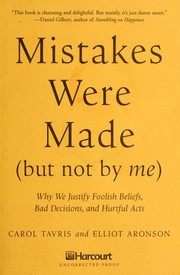Check nearby libraries
Buy this book

At some point we all make a bad decision, do something that harms another person, or cling to an outdated belief. When we do, we strive to reduce the cognitive dissonance that results from feeling that we, who are smart, moral, and right, just did something that was dumb, immoral, or wrong.
Whether the consequences are trivial or tragic, it is difficult, and for some people impossible, to say, “I made a terrible mistake.” The higher the stakes—emotional, financial, moral—the greater that difficulty. Self-justification, the hardwired mechanism that blinds us to the possibility that we were wrong, has benefits: It lets us sleep at night and keeps us from torturing ourselves with regrets. But it can also block our ability to see our faults and errors. It legitimizes prejudice and corruption, distorts memory, and generates anger and rifts. It can keep prosecutors from admitting they put an innocent person in prison and from correcting that injustice, and it can keep politicians unable to change disastrous policies that cost billions of dollars and thousands of lives. In our private lives, it can be the death of love.
Mistakes Were Made (But Not by Me) examines:
-
Why we have so much trouble accepting information that conflicts with a belief we “know for sure” is right.
-
The brain’s “blind spots” that make us unable to see our own prejudices, biases, corrupting influences, and hypocrisies.
-
Why our memories tell more about what we believe now than what really happened then.
-
How couples can break out of the spiral of blame and defensiveness.
-
The evil that men and women can do in the name of God, country, and justice -- and why they don’t see their actions as evil at all.
- Why random acts of kindness create a “virtuous cycle” that perpetuates itself.
Most of all, this book explains how all of us can learn to own up and let go of the need to be right, and learn from the times we are wrong—so that we don't keep making the same mistakes over and over again.
Check nearby libraries
Buy this book

Previews available in: English
Subjects
Fouten, Vergissingen, Cognitive dissonance, Self-deception, Rechtvaardiging, Homicide, Politics, Deception, Research Ethics, Law Enforcement, Self Concept, Criminal Psychology, Prejudice, Truth Disclosure, Medical Ethics, Ethnic Groups, Psychology Repression, Love, Conflict of Interest, Torture, Cognitive Dissonance, Persuasive Communication, Clinical Ethics, Bias, Scientific Misconduct, Marriage, Psychotherapy, Medical Errors, Dissonance (psychology)Showing 1 featured edition. View all 1 editions?
| Edition | Availability |
|---|---|
|
1
Mistakes Were Made (But Not by Me): Why we Justify Foolish Beliefs, Bad Decisions, and Hurtful Acts
May 7, 2007, Harcourt
Hardcover
in English
0151010986 9780151010981
|
aaaa
Libraries near you:
WorldCat
|
Book Details
Published in
Orlando FL, USA
Classifications
Contributors
The Physical Object
ID Numbers
Community Reviews (0)
Feedback?| February 28, 2022 | Edited by ImportBot | import existing book |
| February 13, 2020 | Edited by MARC Bot | remove fake subjects |
| December 13, 2019 | Edited by MARC Bot | import existing book |
| July 21, 2017 | Edited by Mek | adding subject: In library |
| March 18, 2010 | Created by WorkBot | work found |















